If you’re like most drivers, the first time you notice oil spilling out from under your car is when you see it dripping onto the ground from the exhaust pipe.
This can be an alarming sight, but don’t panic! In most cases, a small amount of oil leaking from the exhaust is not a cause for concern.
However, if you notice a large amount of oil coming out of the exhaust or if the oil is thick and black, it could be a sign of a severe problem with your engine.
If you see either of these things, you must take your car to a mechanic immediately to check it out.
In this blog post, we’ll explain what’s happening, the symptoms of oil coming out of exhaust, and how to fix it.
We’ll also share tips on preventing this issue from happening in the future. Read on to learn more.
What's in this post?
How to fix oil coming out of exhaust?
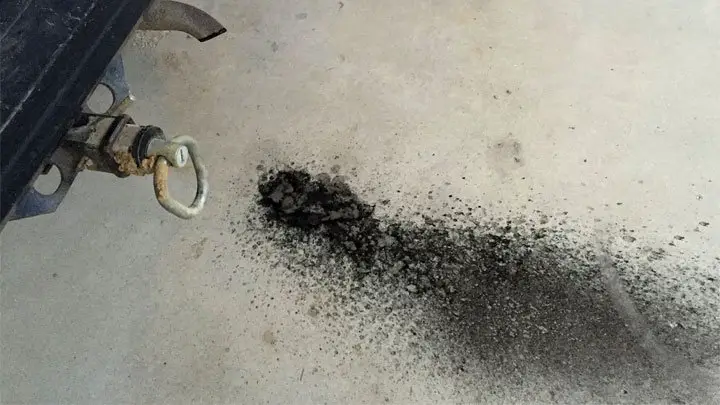
If you have a small amount of oil leakage, you don’t have to worry about it. However, if you’re seeing blue or black smoke coming from your car’s exhaust, it’s important to diagnose and repair the problem as soon as possible.
There are a few ways to fix oil coming out of the exhaust:
Replace the PCV valve.
If the problem is caused by a clogged PCV valve, replacing it with a new one should solve it.
To replace the valve, first locate it and then remove the hose that is connected to it. Next, take out the old valve and insert the new one.
Ensure the new valve is installed in the same direction as the old one. Finally, reconnect the hose and screw it back into place.
With the new valve in place, the oil should no longer be coming out of the exhaust.
Repair or replace worn valve guides
If worn valve guides cause the problem, they will need to be repaired or replaced. Factors like age, heat, and engine vibration can cause this issue.
Replacing or repairing the valve guides is essential to preventing further damage to your engine.
The first step is to remove the cylinder head from the engine block. This will give you access to the valve guides. Once the cylinder head is removed, use a caliper to measure the inner and outer diameters of the guide.
If the guide is more than 0.005 inches larger than its original size, it must be replaced. If the guide is only slightly damaged, you can repair it by machining it to its original size.
Once you have determined whether the valve guide needs to be replaced or repaired, you can begin putting the cylinder head back on. If you are replacing the valve guide, use new seals and gaskets.
Be careful not to over-tighten the bolts when attaching the cylinder head, as this can damage the engine block. With proper care and maintenance, your car’s engine will run smoothly for many future miles.
Replace valve cover gasket
The first step is to take off the old valve cover gasket. Remove the valve cover in just a few minutes by prying it off with a putty knife or screwdriver. Take care not to damage the valve cover itself while removing it.
Next, clean the surface of the valve cover with a clean rag. This will help the new gasket adhere better.
Once the surface is clean, you can apply the new gasket. Make sure it is positioned correctly, then press it into place. You may need a small amount of adhesive to keep it in place.
Finally, replace the valve cover and tighten the screws. This process should prevent oil from coming out of the exhaust.
[amazon box=”B000C2GI4S”]
Replace piston ring
Replacing the piston rings is a relatively simple process, but a qualified mechanic should do it.
First, the engine must be removed from the vehicle. Once the engine is removed, the piston must be removed from the cylinder.
Once the piston is removed, the old piston rings can be pried off, and new ones can be installed.
Finally, the piston and engine can be reassembled and reinstalled in the vehicle. By following these steps, you can replace your piston rings and fix the oil problem from your exhaust.
Repair or replace engine piston
If a damaged engine piston causes the problem, it will need to be repaired or replaced.
It is necessary to disassemble the engine to repair the piston. Once the engine is disassembled, the piston can be removed from the cylinder.
If the piston is only slightly damaged, it can be repaired by machining it to its original size. However, if the piston is severely damaged, it must be replaced.
Once the piston is repaired or replaced, the engine can be reassembled and reinstalled. With proper care and maintenance, your car’s engine will run smoothly for many future miles.
Repair or replace a cracked cylinder head or engine block
If the problem is caused by a cracked cylinder head or engine block, it must be repaired or replaced.
Depending on the size of the crack, it may be possible to repair a cracked cylinder head or engine block.
However, a replacement will be necessary if the crack is large or if there are multiple cracks. Before beginning any repair work, cleaning the area around the damage is crucial to ensure it is free of dirt and debris.
Once the area is clean, the next step is determining the best way to seal the crack. For small cracks, a welding process can be used.
However, it may be necessary to insert a metal sleeve into the engine block for larger cracks. Once the sleeve is in place, it can be welded or bolted.
Finally, checking for oil leaks and ensuring all gaskets and seals are properly installed before starting the engine is important.
By following these steps, it should be possible to successfully repair or replace a cracked cylinder head or engine block.
Have the car inspected by a mechanic
If you’re unsure what’s causing the problem, it’s best to have the car inspected by a qualified mechanic.
They can diagnose the problem and recommend the best course of action. In some cases, they may even be able to repair the problem themselves.
No matter what, it’s always best to have a professional look at your car before attempting any repairs yourself.
What are the symptoms of oil coming out of exhaust?
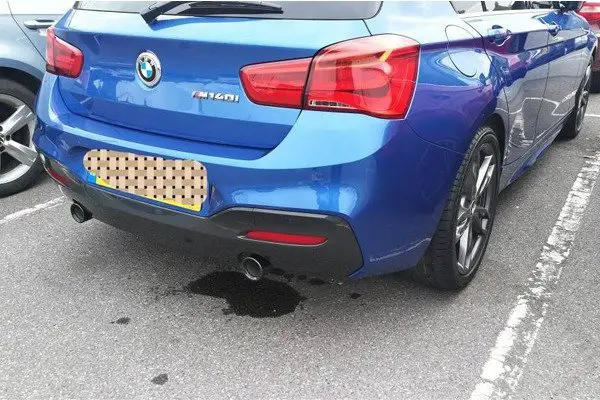
The most apparent symptom of oil coming out of your car’s exhaust is oil dripping from the exhaust pipe!
If you notice this happening, looking closer to see how much oil is coming out is essential.
A small amount of oil leakage is usually not a cause for concern.
However, if you see a large pool of oil collecting under your car, or if the oil is thick and black, it could be a sign of a more severe problem.
Another symptom of oil leaking into the exhaust system is blue or white smoke coming from the tailpipe.
This happens because the oil is being burned along with the fuel in the engine, which can be a sure sign of a problem.
If you notice either of these symptoms, it’s important to take your car to a mechanic as soon as possible so they can diagnose the problem and repair it.
How to diagnose the problem
If you’re seeing blue or black smoke coming from your car’s exhaust, there’s a good chance that oil is leaking into the combustion chamber.
There are a few ways to diagnose the problem:
- Check the engine oil level: If it is low, it could indicate oil leaking into the combustion chamber.
- Look for oil leaks: If you see any oil leaks around the engine, oil may get into the combustion chamber.
- Check for blue or black smoke: If you see blue or black smoke coming from your car’s exhaust, oil is likely mixed in with the exhaust gases.
- Listen for unusual engine noises: Any unusual engine noises could indicate that oil is leaking into the combustion chamber.
- Have the car inspected by a mechanic: If you suspect oil leaks into the combustion chamber, it’s best to have the vehicle inspected by a qualified mechanic.
They will be able to diagnose the problem and make the necessary repairs.
What causes oil coming out of exhaust?
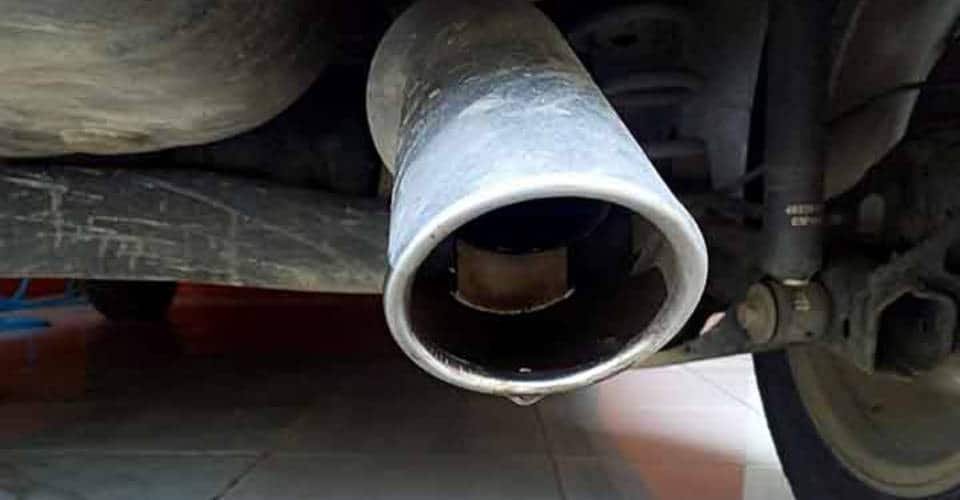
There are several different reasons why oil might be leaking into the exhaust system.
Faulty valve cover gasket
A valve cover gasket is a crucial part of a car’s engine, and it can cause significant problems if it becomes damaged or worn out. One of the most common issues is oil leaking from the exhaust.
The valve cover gasket is a rubber seal between the valve cover and the engine block.
It’s responsible for sealing in the oil that lubricates the engine, and if it starts to wear out or develop leaks, fat can begin to seep out.
This is usually caused by a build-up of pressure in the engine, which forces oil past the gasket and into the exhaust system. In some cases, this can also cause oil to be expelled from the tailpipe.
If left unchecked, this can lead to serious engine damage and decreased performance.
Thankfully, replacing a faulty valve cover gasket is relatively simple and inexpensive, so it is important to catch this problem early on.
[amazon box=”B000C2GI4S”]
Blown Head Gasket
An engine’s head gasket seals the space between the engine block and cylinder head, preventing oil, coolant, and combustion gases from leaking.
A blown head gasket can cause oil to leak into the combustion chamber, leading to smoke coming out of the exhaust.
A leaking head gasket may also result in coolant entering the cylinders, causing the engine to overheat. If not fixed on time, a blown head gasket can cause severe engine damage.
As a result, it is crucial to have any suspected head gasket issues diagnosed and repaired by a qualified mechanic as soon as possible.
Bad piston ring
Another common cause of oil leaks is a bad piston ring.
For a piston engine to work correctly, it must have good piston rings. Piston rings are located on the piston’s outside and help seal the combustion chamber.
They prevent oil and coolant from leaking into the chamber, and they also help to keep the pressure of the gases inside the chamber consistent.
When piston rings become worn or damaged, they can no longer perform their sealing function properly.
This can lead to oil and coolant leaks, leaking oil when parked, and increased pressure inside the chamber. When this happens, oil can be forced out of the exhaust port and into the system.
In addition to causing engine damage, this can create a fire hazard. For these reasons, replacing piston rings when they become damaged is important.
Faulty engine piston
An engine piston is responsible for providing the linear force that turns the crankshaft, which rotates the wheels.
The piston is also responsible for compressing the air-fuel mixture before igniting it. If the piston is faulty, it can cause oil to leak from the seals into the combustion chamber.
When this happens, the oil will burn with the air-fuel mixture and come out of the exhaust pipe as a blue smoke.
In addition to causing an increase in emissions, this can lead to engine damage over time. As a result, it is important to have a faulty piston fixed as soon as possible to avoid further damage.
Clogged PCV Valve
Crankcase gas is fairly clean compared to what goes up the exhaust pipe.
It mainly comprises about 78% nitrogen, 21% oxygen, and trace amounts of other gases like carbon dioxide and water vapor.
However, small amounts of unburned fuel and oil vapors are also present.
Usually, these vapors are drawn off by the Positive Crankcase Ventilation (PCV) system and routed back into the engine to be burned.
However, if the PCV valve becomes clogged, these vapors will build up in the crankcase and eventually find their way into the exhaust stream.
As a result, you may see blue or black smoke coming out of your tailpipe and oil dripping from your exhaust pipe or coating your muffler.
While this is usually just a nuisance, it can lead to more serious problems if left unchecked.
Therefore, it is important to have your PCV valve checked regularly to prevent oil from entering your exhaust system.
Worn Valve Guides
The valve guides seal the gap between the valves and the cylinder head, preventing oil from leaking into the combustion chamber.
Over time, however, the guides can become worn down, allowing oil to seep through. This can cause several problems, including foul-smelling exhaust and decreased fuel economy.
In severe cases, it can also lead to engine damage. Therefore, it is important to replace worn valve guides as soon as possible to avoid any long-term issues.
Cracked cylinder head or engine block
When a cylinder head or engine block cracks, it can cause oil to come out of the exhaust. This is because the crack provides a path for the oil to escape from the engine.
The oil will then mix with the exhaust gases and be expelled through the exhaust system. The oil may also leak into the combustion chamber, causing the engine to smoke.
A cracked cylinder head or engine block can cause major engine damage if left unchecked. Therefore, it is important to have any cracks repaired as soon as possible.
These problems are usually more serious, and if you have either, it’s important to take your car to a mechanic immediately so they can make the necessary repairs.
Useful read: What Would Cause Oil To Spray All Over Engine? And The Cost To Fix It
What can you do to prevent this happen again?
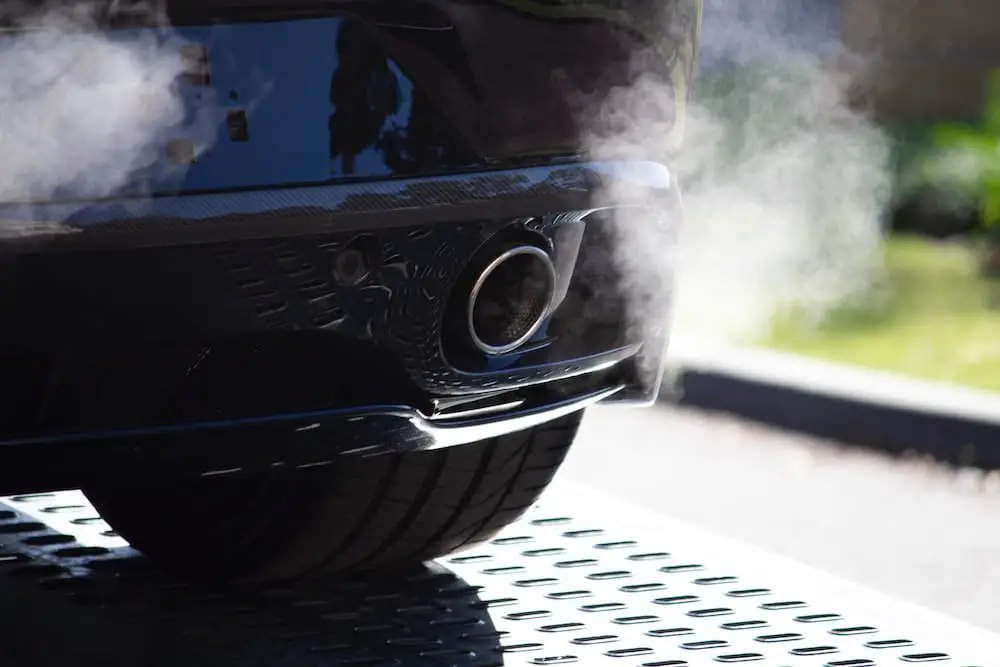
You can do several things to help prevent oil from entering the exhaust system and causing damage.
- Ensure that the engine’s oil level is checked regularly and kept at the correct level.
- Regular maintenance on the engine, such as tune-ups and oil changes, helps to keep it running smoothly and prevents build-up that can lead to problems.
- Avoid overfilling your oil pan – this can cause pressure to build up and cause oil to seep past seals and gaskets.
- Have your car regularly serviced by a qualified mechanic who can inspect all of the seals and gaskets in your engine for signs of wear or damage.
- If you notice any leaks, have them repaired immediately so that oil does not have a chance to enter the exhaust system.
By taking these simple steps, you can help prevent oil from coming out of your exhaust and causing damage to your engine.
How much the repairs are likely to cost?
The oil leak repair cost will vary depending on the severity of the problem.
If a simple oil leak causes the problem, the repairs will likely be relatively inexpensive.
However, if the problem is caused by a cracked engine block or cylinder head, the repairs will likely be much more expensive.
It’s always best to get an estimate from a qualified mechanic before having any work done on your car.
FAQs about oil coming out of exhaust
Can oil leak from an exhaust catch fire?
Yes, oil leaking from the exhaust can potentially catch fire. The hot exhaust pipes can ignite the oil, leading to a dangerous fire.
However, this is relatively rare and usually only happens if the oil leak is severe. If you notice any oil leaks in your vehicle, it’s important to have them repaired as soon as possible to avoid a fire risk.
What is the liquid that comes out of a car exhaust?
The vast majority of car exhaust is composed of water vapor and carbon dioxide, which are harmless to human health.
However, a small percentage of car exhaust contains harmful compounds such as carbon monoxide, nitrogen oxides, and particulate matter.
These pollutants can cause various health problems, including respiratory illness and heart disease.
While most modern cars are equipped with pollution-control devices that help reduce emissions, it is still important to reduce your exposure to car exhaust.
Choose routes that avoid heavy traffic, and ventilate your garage well when starting your car.
By taking these simple precautions, you can help protect yourself and your family from the harmful effects of car exhaust.
Can I drive my car if it’s leaking oil from exhaust?
No, you should not drive your car if it’s leaking oil from the exhaust. If you notice oil coming out of your car’s exhaust, it is important to have the vehicle diagnosed by a qualified mechanic as soon as possible.
Driving with an oil leak can cause severe damage to your engine and may even lead to a complete engine failure.
In addition, oil coming out of the exhaust may indicate a hazardous condition that could be dangerous to you and other motorists.
For these reasons, it is best to err on the side of caution and have your car checked out by a professional if you notice any signs of an oil leak.
What are the consequences of driving with an oil leak in the exhaust?
If you drive with an oil leak in the exhaust, it can cause damage to the engine. Oil leaks can also lead to increased engine noise, decreased fuel efficiency, and engine knocking. If left unchecked, oil leaks can eventually cause the engine to seize.
Therefore, it’s important to have any oil leaks repaired as soon as possible by a qualified mechanic.
What are some common causes of oil leaks in exhaust systems?
There are a few common causes of oil leaks in exhaust systems. One is a faulty gasket, which can cause oil to leak from the engine into the exhaust system.
Another common cause is a cracked exhaust manifold, allowing oil to leak into the exhaust system.
A third common cause of oil leaks is a hole in the exhaust pipe, which can allow oil and other fluids to leak into the atmosphere.
These are just a few of the most common causes of oil leaks in exhaust systems. If you notice any oil leaks in your vehicle, it’s important to have them repaired as soon as possible to avoid further damage.
What is the difference between engine oil leaks and oil coming out from the exhaust?
An engine oil leak is when oil leaks from the engine into the surrounding area. Various factors, including a faulty gasket or a cracked exhaust manifold, can cause this.
Oil coming out from the exhaust is when oil leaks from the engine into the exhaust system. Some factors, including a hole in the exhaust pipe can cause this.
Both engine oil leaks and oil coming out from the exhaust can lead to serious damage if left unchecked.
Therefore, it’s important to have any leaks repaired as soon as possible by a qualified mechanic.
Final thoughts
Exhaust fumes contain poisonous gases like carbon monoxide, which can cause serious health problems.
If you see oil coming out of exhaust, it’s important to immediately fix the problem and prevent it from happening again.
If you need help with what to do, take your car to a mechanic and have it looked at. They can diagnose the problem and recommend the best course of action.
Follow the tips in this blog post to get your car running smoothly and safely. If you enjoyed this blog post, check out our other posts on car maintenance and repairs!



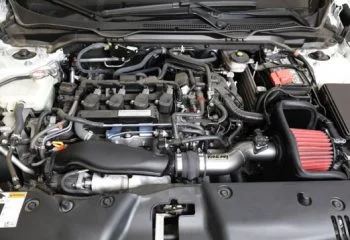
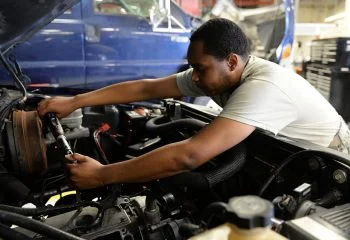
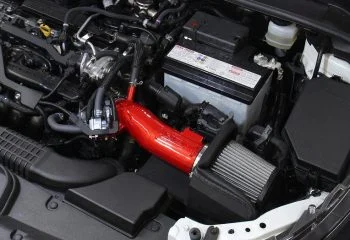
The RX300 got overheating,if the knock engine sensor burn the rings and pistons damage ,i change the rings including the pistons after everything ,i start the car it overheating again even oil is coming from, i change the top the overheating is no more again but the oil is still coming out from exhaust, what could be the cause?